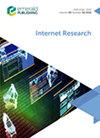The impacts of within-task and between-task personal Internet usage on employee creative performance: the moderating role of perceived organisational support
IF 5.9
3区 管理学
Q1 BUSINESS
引用次数: 0
Abstract
PurposeEmployees' personal Internet usage (PIU) has become increasingly common at work. It is important for both researchers and managers to understand how PIU affects employee creative performance. This study aims to examine what kind of PIU is likely to increase or decrease employee creative performance and why. The authors also examine a potential boundary condition for the effect of PIU on employee creative performance.Design/methodology/approachBased on conservation of resource (COR) theory and broaden and build theory, the authors investigated the impact of two types of PIU, namely within-task PIU and between-task PIU, on the creative performance of knowledge workers. The authors conducted a daily diary study and surveyed 107 knowledge workers in China over 10 consecutive working days (n = 1,070) to test the model.FindingsThe authors find that within-task PIU reduces knowledge workers' creative performance by decreasing the workers' positive emotion, whereas between-task PIU promotes the performance by increasing positive emotion. The above relationships become stronger when knowledge workers perceive a higher level of organisational support.Originality/valueThe authors' study makes theoretical contributions by advancing researchers' understanding of the situations in which PIU may decrease or increase employee creative performance. The findings are also useful for developing organisational policies to take advantage of the positive side of PIU whilst avoiding PIU's negative side.任务内和任务间个人互联网使用对员工创造性表现的影响:感知组织支持的调节作用
目的员工的个人互联网使用(PIU)在工作中变得越来越普遍。对于研究人员和管理者来说,了解PIU如何影响员工的创造性表现是很重要的。本研究旨在检验什么样的PIU可能会提高或降低员工的创造性表现以及原因。作者还考察了PIU对员工创造性绩效影响的潜在边界条件。设计/方法论/方法基于资源守恒理论和扩展构建理论,研究了任务内和任务间两种类型的PIU对知识工作者创造性表现的影响。作者进行了一项每日日记研究,并在连续10个工作日(n=1070)内对中国107名知识工作者进行了调查,以测试该模型。研究发现,任务内PIU通过降低知识型员工的积极情绪来降低其创造性表现,而任务间PIU通过增加积极情绪来提高其创造性表现。当知识型员工感知到更高水平的组织支持时,上述关系会变得更强。原创性/价值作者的研究通过提高研究人员对PIU可能降低或提高员工创造性表现的情况的理解,做出了理论贡献。研究结果也有助于制定组织政策,利用PIU的积极一面,同时避免PIU的消极一面。
本文章由计算机程序翻译,如有差异,请以英文原文为准。
求助全文
约1分钟内获得全文
求助全文
来源期刊

Internet Research
工程技术-电信学
CiteScore
11.20
自引率
10.20%
发文量
85
审稿时长
>12 weeks
期刊介绍:
This wide-ranging interdisciplinary journal looks at the social, ethical, economic and political implications of the internet. Recent issues have focused on online and mobile gaming, the sharing economy, and the dark side of social media.
 求助内容:
求助内容: 应助结果提醒方式:
应助结果提醒方式:


